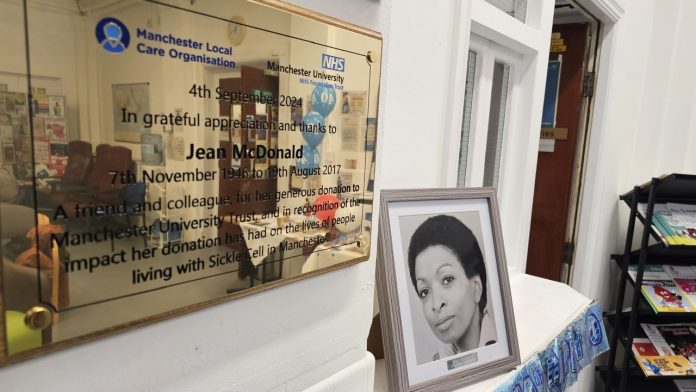A pioneering Manchester centre has been labelled a “lifeline” for people living with Sickle Cell and Thalassaemia as it marks its 40thanniversary.
The Manchester Sickle Cell and Thalassaemia Centre in Denmark Road was officially opened in 1984, becoming the first NHS community Sickle Cell centre in the UK.
Dozens of service users, staff past and present, voluntary sector partners and community representatives gathered to mark the centre’s 40th anniversary and the start of Sickle Cell Awareness Month 2024.
The event also saw the opening of the Miss Jean Mcdonald Suite to celebrate the life and achievements of the former Manchester health visitor who lived with Sickle Cell Disease. Jean, who passed away in 2017, left a substantial legacy which has funded vital research and community engagement programmes.
Manchester University NHS Foundation Trust recently funded a renovation of the centre, which is run by the Manchester Local Community Organisation.
Mark Cubbon, Group Chief Executive Officer of Manchester University NHS Foundation Trust, praised the work of centre staff over the decades and the ongoing impact of Jean’s legacy.
Mark said: “Our understanding and awareness of Sickle Cell and Thalassaemia has developed enormously over the last 40 years, and this ground-breaking centre has, over the years, become a lifeline for people living with these debilitating conditions. The centre’s recent renovation has provided a real boost for everyone who uses it, and the staff who work from here.
“We are very grateful for Jean Mcdonald’s incredibly generous donation which funded significant engagement with Manchester communities affected by these conditions, helping improve the support which the NHS and our social care and voluntary sector partners can offer them. Jean’s legacy also funded vital research which is now benefitting people across the UK and beyond who are living with Sickle Cell and Thalassaemia.”
Katy Calvin-Thomas, Chief Executive of Manchester Local Care Organisation, highlighted the centre’s pioneering role in supporting people living with Sickle Cell and Thalassaemia.
Katy said: “This centre plays such an important role in the local community and has done for over 40 years. It’s often people’s first point of contact with healthcare services, and the support which it provides continues through their journey with these conditions. We’re also very grateful to have such fantastic support from our community partners in Greater Manchester, who we work very closely with to give people the best possible holistic care.”







